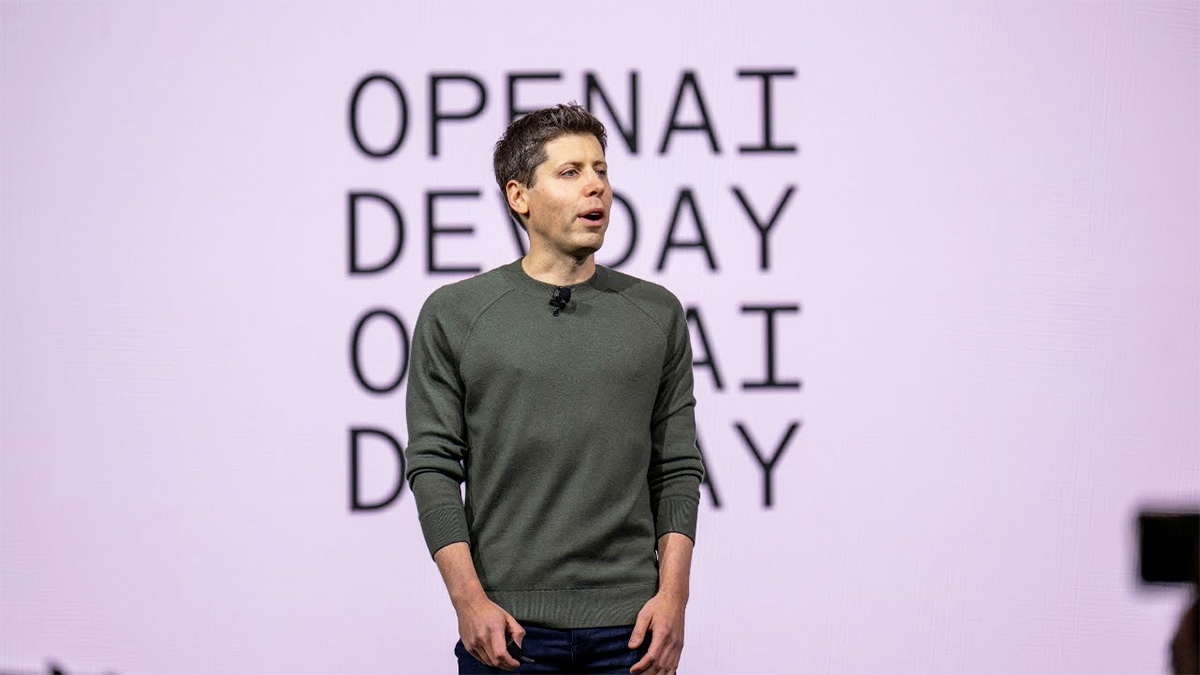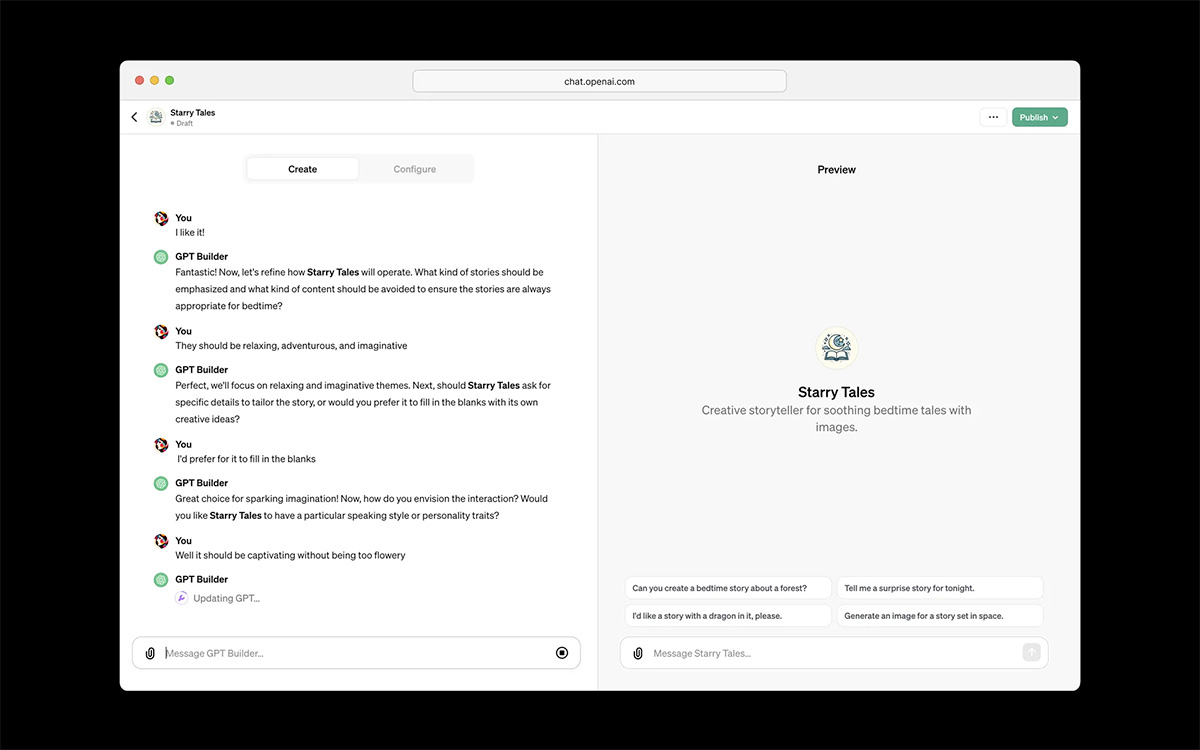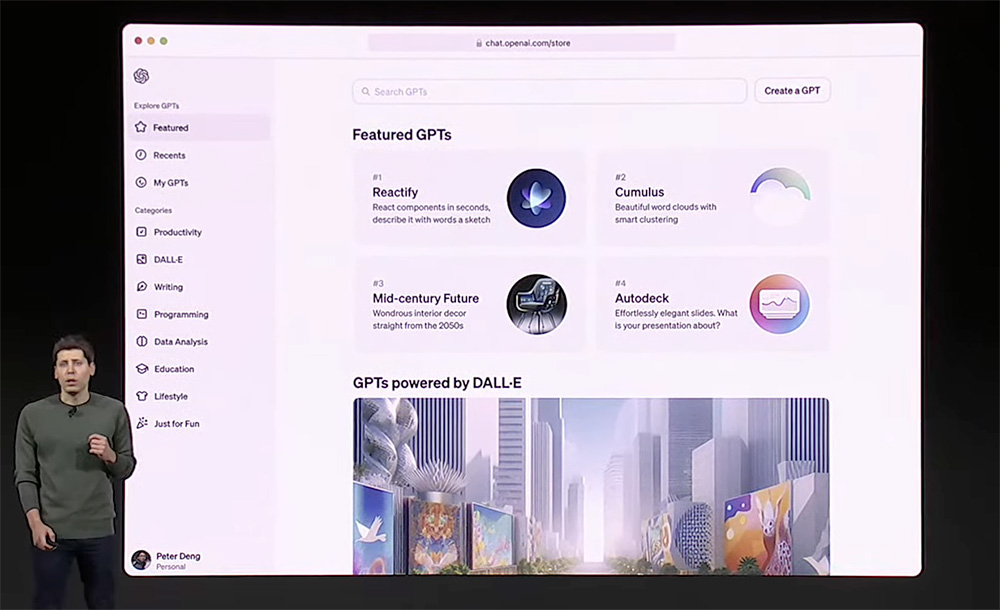
OpenAI held its DevDay event this Monday, November 6th, marking its first-ever developers’ conference, which was full of announcements.
The company behind ChatGPT is launching new artificial intelligence models and APIs. Here’s a summary of the different announcements made during the event.
Staggering figures for ChatGPT
In less than a year, ChatGPT has become a global product with rapid popularity. The service holds the record for the fastest adopted product in the world, having reached 100 million monthly users just a few months after its launch.
The tool has contributed to democratizing the use of artificial intelligence among the general public. OpenAI used its DevDay conference to reveal that more than 100 million people engage with the chatbot each week.
The company adds that over 2 million developers have already built solutions around its API.
GPT-4 Turbo
At its developer event, OpenAI presented GPT-4 Turbo, an improved version of its famous GPT-4 model.
OpenAI indicates that this new model is deployed in two versions: while the first is dedicated exclusively to textual analysis, the second focuses on understanding both text and images.
The text-specific model is priced at $0.01 for 1000 input tokens (a token is a “chunk of a word” of about 4 characters) and $0.03 for 1000 output tokens (the AI’s response).
Generating a 1080×1080 pixel image with GPT-4 Turbo will cost precisely $0.00765.
Another significant feature of this offering: GPT-4 Turbo offers a much larger contextual window than GPT-4. It is 128,000 tokens, approximately 100,000 words. That’s 4 times larger than what GPT-4 currently offers.
Building your own GPTs
Another major feature announced at OpenAI’s DevDay conference is the ability for users to create their own versions of ChatGPT, for fun or productivity (take your pick).
Users will be able to build their bots using only prompts (the messages sent to the AI), without the need for developer skills.

OpenAI will also allow companies to develop their own “internal GPTs,” connected to their knowledge bases. Developers will have the necessary tools to connect these independent chatbots to their databases or email systems, as well as to import external data into the system.
A “GPT Store” to sell your bots
In line with this, the company led by Sam Altman plans to allow users to publish their “homemade GPTs” on a store, scheduled for release at the end of the month.
These bots could each have a different approach to various tasks, whether it be explaining the rules of a board game, helping your children learn math, or even generating sticker designs.

Initially, only verified creators will be able to publish their solutions. A financial remuneration might later be established for the most popular bots on this platform, although OpenAI has not committed to anything specific yet.
A collection of customized GPTs are already available to users with a ChatGPT Plus or Enterprise account. The creation of your own GPTs will soon be accessible in beta.
With this project, OpenAI aspires to make its store the first true artificial intelligence platform.
For more information on these customizable GPTs, you can read the announcement post on OpenAI’s blog.
On the API front
OpenAI is launching an “Assistants API” that will allow developers to create intelligent assistants in their applications, to create interactive and personalized user experiences. The company illustrated this new API by presenting the case of an intelligent holiday planner.
This assistant, for instance, can compile a list of sites to visit in a city and highlight them on a map.
The assistants based on this new API also have access to new tools, such as the code interpreter, which writes and executes Python code, and can generate graphs and process files with different data and formats, and a retrieval tool, which allows the model to enrich its knowledge with external elements (proprietary data, documents…).
The function call has evolved and allows developers to describe the functions of their applications or external APIs to the model so that it provides a JSON object containing the arguments to be passed to these functions. It is now possible to call multiple functions with a single message, to trigger several actions simultaneously.
Among other API announcements, DALL-E 3, the latest version of the generative artificial intelligence capable of creating images from textual descriptions, is also made available. Images generated via calls to this API range from 1024×1024 px to 1792×1024 px. Image generation via calls to this API will be billed at $0.04 per image.
Support for copyright infringements
It’s no big news: with their rise, AIs have stepped on toes (quite a bit) in the realm of copyright. The use of such tools, which base their knowledge on accessible and sometimes intellectually protected sources, can lead to legal action in certain cases.
Surprisingly, OpenAI announced at its DevDay a “Copyright Shield” program, which aims to support companies when they are faced with a copyright infringement complaint.
With this program, the company commits to covering the legal costs incurred in such situations when the content in question has been generated by its developer platform or ChatGPT Enterprise solution.
Recently, companies such as Microsoft, Amazon, or IBM have also announced that they would indemnify their users of their services based on artificial intelligences in such situations.
You can watch the full OpenAI DevDay conference in the video below:
Among other big AI news: Elon Musk launched his own chatbot Grok this weekend, to compete with ChatGPT (after all, maybe the timing was not coincidental).
Also read on The Coding Love:
- 🚀 Elon Musk launches Grok, his AI meant to rival ChatGPT
- 🎃 For Halloween, I asked ChatGPT to tell me the most terrifying story possible for a developer
- 🐧 Someone created an Angry Birds video game clone using only AI
- 🦾 Boston Dynamics’ robot dog now speaks thanks to ChatGPT



